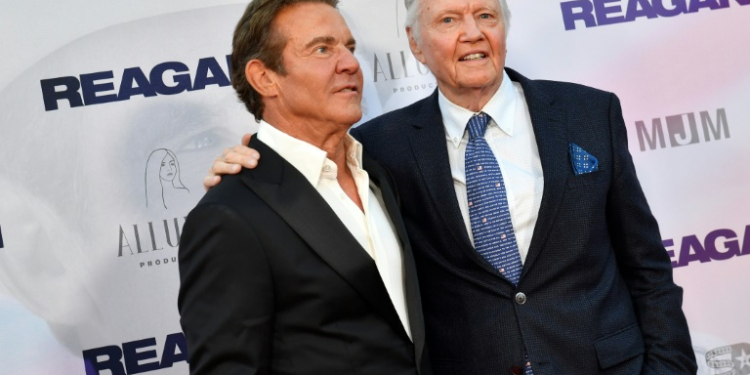Los Angeles (United States) (AFP) – Movie critics and audiences don’t always see eye-to-eye — but rarely have they appeared as divided as they are over “Reagan,” a highly flattering biopic of the Republican president released just months before another deeply polarized US election. The film, starring Dennis Quaid as Ronald Reagan, came out last week and boasts an audience rating of 98 percent on the Rotten Tomatoes website. But it impressed just 21 percent of critics.
Professional reviewers mostly trashed the film as a clunky hagiography that omits a controversial leader’s flaws, while thousands of fan responses accused elitist critics of knocking an “uplifting” and “patriotic” film because of their own left-wing politics. “You add the politics into this one, and all of a sudden it gets extremely skewed,” agreed director Sean McNamara. Reading many of the reviews, “I find that they definitely are attacking Reagan…as opposed to just the filmmaking,” he told AFP.
But rather than shy away from it, the filmmakers and publicists behind “Reagan” have actively leaned into the movie’s split reception. One press release this week boasted about “the greatest gap between critics and fans in the history of Hollywood theatrical films.” A veteran Hollywood publicist, who is not involved in the film, told AFP that claim “sounds like PR spin to me.” Regardless, the timing of the movie in a febrile election season has certainly helped to draw attention. Independent box office analyst David A. Gross said the film’s $10 million opening weekend gross was “above average” for a political biography.
Based on Paul Kengor’s 2006 book “The Crusader: Ronald Reagan and the Fall of Communism,” the film chronicles the 40th US president’s life story from childhood, through Hollywood, and into state and national politics. Filmmakers say the timing of the movie’s release so close to one of the most tumultuous US presidential campaigns of all time is coincidental. The movie was first announced in 2010, finally shot in 2020, and then delayed further by the Covid-19 pandemic and Hollywood strikes.
“If you watch this movie through the lens of a non-election year…you would have just watched it, I think, more as a movie,” said McNamara. “But I think now, when people look at it, you can’t help but see the similarities.” Indeed, the film begins with Reagan being shot in 1981, echoing the assassination attempt on fellow Republican Donald Trump’s life just this summer. It also portrays Reagan facing down campus protests, and locking horns with his Democratic rival in presidential debates over issues such as the incumbent’s advancing age.
“Those things happened in the last few months, and all of a sudden,” said McNamara. “So even when I watch the film now, I go, ‘Wow, that’s kind of happening today’… I was shocked at the similarities.” Further stoking the film’s divisive reputation, Jon Voight — the prominent conservative Hollywood actor, who co-stars in the movie — alleged that Facebook was censoring advertisements for the film. Parent company Meta told AFP “a handful of ads” for the film had been incorrectly identified by an algorithm as election-related posts — which would require prior authorization and labeling — and so were temporarily restricted. But they were swiftly restored.
As a maker of several Christian faith-based movies, McNamara is used to making films “for the audience” that will not necessarily appeal to critics. But for the director, the gulf in responses to “Reagan” has been greater still, underscoring the stark divisions wracking the nation. While Reagan’s 1980s heyday was a time of “a lot of vitriol” too, it was still a “kinder, gentler nation” where people could disagree politically but still meet for drinks or a barbecue, said McNamara. Older audiences are particularly connecting with “Reagan” because they remember that era, and “they see something that was going on in America back then that isn’t happening now,” he said.
What would Reagan himself make of the current climate? “Reagan was a great communicator, and I think he would have tried to bridge that gap, and talk to people,” said McNamara. “I think the biggest thing he would look at the world today and go, ‘I wish they would try to compromise just a bit more.'”
© 2024 AFP











